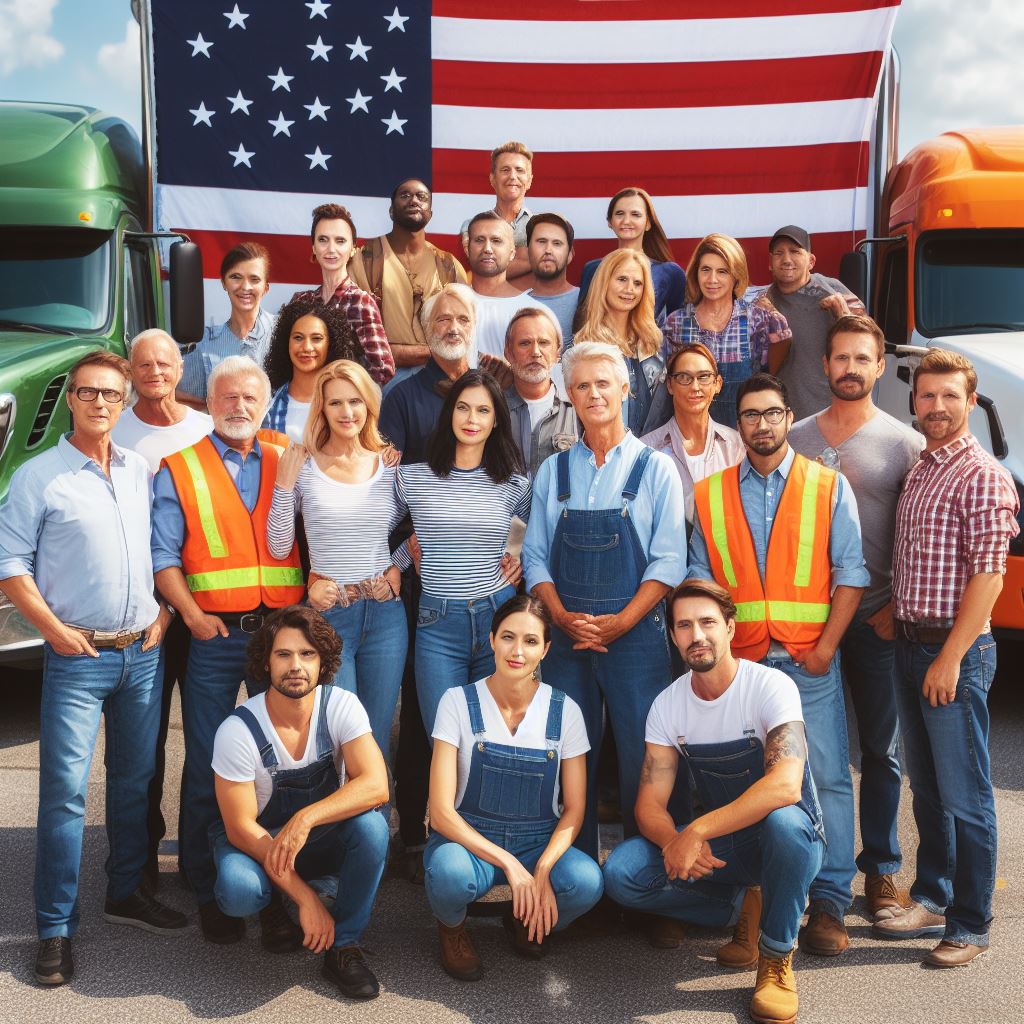Introduction
A. Women in Trucking
Breaking barriers, women in trucking challenge stereotypes, carving paths in an industry traditionally dominated by men.
B. Male-Dominated Field
In the trucking realm, women face challenges, from stereotypes to unequal opportunities in what remains predominantly a male-centric domain.
C. Purpose of the Blog Post
This post aims to spotlight women making strides in trucking, providing insights, tips, and inspiration for those aspiring to navigate and conquer the challenges within this dynamic, male-dominated profession.
Overview of the Trucking Industry
In this section, we will provide an overview of the trucking industry, including statistics and the economic importance of the industry.
We will also highlight the challenges faced by truckers in this male-dominated field.
A. Statistics about the Trucking Industry
- The trucking industry employs over 3.5 million professional truck drivers in the United States.
- Trucking is responsible for moving over 70% of the country’s total freight tonnage.
- There are around 1.2 million trucking companies operating in the United States.
- The industry generates over $700 billion in revenue annually.
B. Economic Importance of the Trucking Industry
The trucking industry plays a crucial role in the economy, facilitating the movement of goods and ensuring timely deliveries across the country.
Without truckers, businesses would struggle to receive supplies and deliver products to their customers.
Trucking also contributes significantly to job creation.
The industry provides employment opportunities for millions of individuals, supporting local communities and the overall growth of the economy.
C. Challenges Faced by Truckers
While the trucking industry offers various opportunities, it also presents numerous challenges, especially for women breaking barriers in this male-dominated field.
- Gender Bias: Women often face discrimination and stereotypes in the trucking industry, making it harder for them to gain respect and acceptance.
- Physical Demands: The nature of the job requires stamina and physical strength, which can be a challenge for some women.
- Isolation and Long Hours: Truckers spend long hours on the road, away from family and friends, which can be mentally and emotionally draining.
- Safety Risks: Truckers face safety hazards, including accidents and robberies, making it crucial for them to remain vigilant at all times.
Despite these challenges, women in the trucking industry have been breaking barriers and making significant contributions.
They have proven their competence and dedication, excelling in their roles as truck drivers, dispatchers, and even in leadership positions within trucking companies.
Organizations and initiatives have emerged to support women in trucking, providing resources, mentorship, and networking opportunities.
These initiatives aim to address the challenges faced by women in the industry and promote gender equality.
Overall, the trucking industry continues to evolve, recognizing and welcoming the valuable contributions of women.
It is essential to support and empower women in trucking, ensuring equal opportunities for all individuals who wish to pursue a career in this field.
Historical Perspective on Women in Trucking
Trucking was once considered a male-dominated field, with women facing numerous challenges and barriers.
However, women have made significant strides in breaking down these barriers and establishing themselves in the industry.
A. The history of women in trucking
The history of women in trucking can be traced back to the early 20th century when World War I created a shortage of male truck drivers.
Women stepped in to fill the gap, proving their capabilities as drivers and mechanics.
Transform Your Career Today
Unlock a personalized career strategy that drives real results. Get tailored advice and a roadmap designed just for you.
Start NowDespite their contribution during the war, women faced resistance and discrimination when trying to pursue trucking as a career after the war ended.
However, in the 1970s, women in the United States began to actively challenge gender barriers in various industries, including trucking.
The Women’s Trucking Federation of America was established in 1976 with the aim of promoting the advancement of women in trucking.
This marked a turning point and acted as a catalyst for the progress of women in the industry.
Since then, women have continued to make strides in trucking, breaking through stereotypes and pursuing successful careers.
Today, there are approximately 200,000 women working as commercial truck drivers in the United States alone.
This number is expected to grow as more women recognize the opportunities and benefits that the trucking industry offers.
B. Progress or milestones
Several milestones highlight the progress of women in trucking.
In 1989, Ford launched its Women in Trucking program, which aimed to recruit and train more women for careers in the industry.
This program helped raise awareness and led to an increase in the number of female truck drivers.
Another significant milestone occurred in 2007 when Ellen Voie founded Women In Trucking Association (WIT).
This organization focuses on empowering women in the industry through advocacy, education, and community building.
WIT has played a crucial role in bridging the gender gap in trucking and promoting inclusivity.
Women in trucking have also achieved notable accomplishments.
For instance, Ina Daly became the first female driver to win the National Truck Driving Championships in 1986.
Since then, more women have excelled in various aspects of the industry, including truck driving competitions, leadership roles, and entrepreneurship.
C. Significant women in the industry
The presence of significant women in the industry has paved the way for others.
Joan Claybrook served as the first female Administrator of the National Highway Traffic Safety Administration (NHTSA) and advocated for policies that improved safety for all truckers.
Shelley Uvanile-Hesch, amidst adversity, founded the Women’s Trucking Federation of Canada in 2017, aiming to address gender diversity and safety in trucking.
In essence, the historical perspective on women in trucking showcases the significant progress made by women in breaking barriers and establishing themselves in a once male-dominated field.
Transform Your Career Today
Unlock a personalized career strategy that drives real results. Get tailored advice and a roadmap designed just for you.
Start NowFrom early pioneers to the organizations advocating for gender equality, women have proven their capabilities and continue to excel in the trucking industry.
It is vital to recognize and celebrate their contributions while promoting further opportunities for women in this field.
Barriers Faced by Women in Trucking
Women in the trucking industry face numerous barriers that make it challenging for them to break through and succeed in a male-dominated field.
These barriers include stereotypes, biases, physical challenges, and a lack of representation and support.
A. Stereotypes and Biases faced by Women
- Women in trucking often face stereotypes that they are not strong or capable enough for the job.
- There is a prevalent bias that women are more emotional and therefore unfit for the demands of the industry.
- Negative assumptions persist regarding women’s ability to handle the physical aspects of the job.
- Some industry professionals still believe that women are more prone to accidents or making mistakes on the road.
- Women may also face skepticism or condescension from male colleagues and supervisors.
B. Physical Challenges of the Job
- Trucking requires physical endurance, including long hours of sitting and driving, which can be physically demanding for everyone.
- Beyond the physical demands, women face unique challenges such as finding appropriate restroom facilities during routes.
- Lifting and securing heavy cargo can also be more challenging for women due to differences in physical strength.
- The demanding nature of the job can lead to potential health issues, including musculoskeletal problems and sleep disturbances.
- Women who are pregnant or have other specific health needs may face additional challenges and require accommodations.
C. Lack of Representation and Support
- Women are severely underrepresented in the trucking industry, making up only a small percentage of the workforce.
- This lack of representation can discourage women from entering the field and perpetuate the idea that it is not suitable for them.
- Many companies lack policies and initiatives aimed at supporting and encouraging women to pursue careers in trucking.
- Support networks and mentorship opportunities specifically tailored to women in the industry are often limited or non-existent.
- The absence of female role models further compounds the difficulties faced by women entering or working in the industry.
Breaking through these barriers requires concerted efforts from both the industry and society as a whole.
Companies need to actively work towards promoting diversity and inclusivity, creating supportive environments with fair policies for women in trucking.
Additionally, initiatives such as mentorship programs and networking opportunities can help women build connections and gain valuable insights from those who have successfully navigated the industry.
Education and awareness campaigns can also help challenge and debunk the stereotypes and biases surrounding women in trucking.
Finally, targeted recruitment efforts aimed at attracting and retaining more women can help increase representation and create a more inclusive industry.
By addressing these barriers and working towards a more supportive and inclusive trucking industry, we can create equal opportunities for women and ensure their valuable contributions are recognized and celebrated.
Read: Understanding the Different Truck Driver License Types

Breaking Barriers: Stories of Women in Trucking
Trucking has long been considered a male-dominated field, but women have been breaking barriers and making their mark in this industry.
In this section, we will share success stories of women who have overcome barriers, discuss their experiences and achievements, and highlight organizations and initiatives supporting women in trucking.
A. Success Stories of Women in Trucking
- Lisa Johnson, a trailblazer in the industry, became the first female truck driver to start her own successful transportation company.
- Sarah Davis proved that gender is not a limitation as she won multiple awards for her exceptional driving skills.
- Karen Turner shattered stereotypes by becoming the first female truck mechanic in her hometown.
These women serve as inspiration for aspiring female truckers, showing that determination and hard work can lead to success in this traditionally male-dominated field.
B. Experiences and Achievements of Women in Trucking
- Lisa Johnson, a trailblazer in the industry, became the first female truck driver to start her own successful transportation company.
- Sarah Davis proved that gender is not a limitation as she won multiple awards for her exceptional driving skills.
- Karen Turner shattered stereotypes by becoming the first female truck mechanic in her hometown.
These women’s experiences highlight the challenges they faced in a field dominated by men and the determination they demonstrated to achieve their goals.
C. Organizations and Initiatives Supporting Women in Trucking
- Women In Trucking Association: This organization promotes the employment and advancement of women in the trucking industry through various initiatives and programs.
- She Drives Trucks: An online community that provides resources, mentorship, and networking opportunities for women in the trucking industry.
- Truckers Against Trafficking: This organization trains truck drivers, including women, to recognize and report human trafficking incidents that they may come across on the road.
These organizations and initiatives play a crucial role in supporting and empowering women in trucking, creating a more inclusive and diverse industry.
In fact, women have been breaking barriers and achieving remarkable success in the male-dominated field of trucking.
Through their inspiring stories, we can see that hard work, determination, and the support of organizations and initiatives have enabled these women to overcome obstacles and thrive in their careers.
With continued efforts to promote gender equality and inclusivity, the future looks promising for women in trucking.
Read: Pros and Cons: Life as a Long-Haul Truck Driver
Transform Your Career Today
Unlock a personalized career strategy that drives real results. Get tailored advice and a roadmap designed just for you.
Start NowDelve into the Subject: The Evolution of the Logistician Role in the U.S. Over Decades
Progress and Positive Changes in the Industry
In recent years, the trucking industry has shown significant progress in its attitudes and perceptions towards women.
Initiatives focused on gender diversity and inclusivity have played a pivotal role in breaking barriers and creating equal opportunities within the field.
A. Changes in Attitudes and Perceptions
- Greater acceptance of women in non-traditional roles has been observed within the trucking industry.
- Previously, trucking was considered a male-dominated field, but this perception is slowly changing.
- Attitudes towards women in trucking are becoming more positive, challenging the stereotypes that existed before.
B. Initiatives Focused on Gender Diversity and Inclusivity
- The Women in Trucking Association has been instrumental in promoting the role of women within the industry.
- This association actively advocates for the recruitment, retention, and advancement of women in trucking.
- They organize events, webinars, and mentorship programs to support and empower women in the field.
- Trucking companies are embracing diversity and implementing initiatives to encourage more women to join the industry.
- Some companies have established Women’s Leadership Councils to further enhance gender inclusivity.
C. The Importance of Equal Opportunities
- Equal opportunities for women in trucking are essential for the industry’s growth and success.
- The skill set required for trucking is not based on gender but on competence and dedication.
- By providing equal opportunities, the industry can tap into a larger pool of talent and benefit from fresh perspectives.
- Women bring unique skills to the industry, such as exceptional communication and multitasking abilities.
- Investing in women’s careers in trucking creates a more balanced and dynamic workforce.
Progress and positive changes in the trucking industry are evident as attitudes and perceptions towards women continue to evolve.
Initiatives focused on gender diversity and inclusivity are breaking down barriers and providing equal opportunities for all.
By embracing these changes and recognizing the value women bring to the field, the industry can thrive and set an example for other male-dominated sectors.
Read: Essential Safety Tips Every Truck Driver Should Know
Empowering Women in Trucking
A. Ways to encourage and support women in pursuing trucking careers
When it comes to the trucking industry, women have historically faced numerous barriers in breaking into what has traditionally been a male-dominated field.
However, there are various ways to encourage and support women in pursuing trucking careers, allowing them to thrive and contribute to this important industry.
1. Providing Supportive Environments
- Create mentorship programs where experienced women truckers can guide and inspire newcomers.
- Establish support groups and online communities to connect women in the industry and share experiences.
- Collaborate with trucking companies to create inclusive workplaces that value diversity and equal opportunities.
2. Offering Specialized Training Programs
- Develop training programs that target women who are interested in trucking careers.
- Provide comprehensive education on trucking regulations, safety procedures, and overall industry knowledge.
- Offer hands-on training to build confidence and ensure competency in operating commercial vehicles.
3. Scholarship Opportunities for Women
- Establish scholarships specifically for women pursuing trucking careers to alleviate financial barriers.
- Collaborate with industry organizations to offer financial assistance for training and certification programs.
- Partner with educational institutions to provide tuition support for women entering trucking programs.
4. Promoting the Benefits of Diversity
- Emphasize the importance and advantages of gender diversity in the trucking industry.
- Highlight the unique perspectives and skills that women can bring to the table.
- Showcase success stories of women who have excelled in the trucking industry as role models.
5. Breaking Stereotypes and Changing Perceptions
- Educate the public about the challenging and rewarding aspects of trucking careers for women.
- Organize awareness campaigns to challenge gender stereotypes associated with the industry.
- Celebrate the achievements of women truckers through media coverage and industry recognition.
6. Addressing Work-Life Balance
- Create policies and practices that support work-life balance for women in the trucking industry.
- Offer flexible scheduling options to accommodate family and personal commitments.
- Provide resources for childcare and support networks for women on the road.
7. Collaboration with Trucking Associations
- Partner with trucking associations to advocate for equal opportunities for women in the industry.
- Create platforms for women’s voices to be heard and their concerns to be addressed.
- Collaborate on initiatives to improve recruitment, training, and retention of women truckers.
8. Continuous Industry Evolution
- Encourage the development of innovative technologies that enhance safety and efficiency in trucking.
- Promote automated and ergonomic solutions that cater to the needs of all truckers, regardless of gender.
- Support research initiatives that focus on improving working conditions for women in the industry.
By implementing these strategies, we can encourage and support more women to pursue fulfilling careers in trucking, breaking barriers and achieving success in this traditionally male-dominated field.
Read: The Evolution of the Trucking Industry in America
Uncover the Details: Career Progression and Opportunities for Conductors
Conclusion
This blog post discussed the challenges faced by women in the male-dominated field of trucking.
We highlighted their determination, resilience, and skills in breaking barriers.
It is crucial to recognize and support women in this industry to create a more inclusive and diverse workforce.
By empowering and encouraging women in trucking, we can pave the way for a brighter future.
Let’s stand together and break down the barriers that limit opportunities for women in trucking.
Support and empower them on their journey towards success.
[E-Books for Sale]
The Big Book of 500 High-Paying Jobs in America: Unlock Your Earning Potential
$19.99 • 500 High-Paying Jobs • 330 pages
Explore 500 high-paying jobs in America and learn how to boost your career, earn more, and achieve success!
See All 500 High-Paying Jobs of this E-Book
1001 Professions Without a Degree: High-Paying American Jobs You Can Start Now
$19.99 • 1001 Professions Without a Degree • 174 pages
Discover 1001 high-paying jobs without a degree! Unlock career tips, skills, and success strategies for just $19.99!




